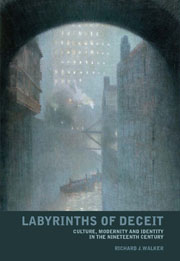Book contents
- Frontmatter
- Contents
- Acknowledgements
- Introduction: Tracing the fragments of modernity
- Part I (De)Generating doubles: duality and the split personality in the prose writing of James Hogg, Robert Louis Stevenson and Oscar Wilde
- Part II The stripping of the halo: religion and identity in the poetry of Alfred Tennyson, James ‘B. V.’ Thomson and Gerard Manley Hopkins
- Introduction
- 4 A life of death: Alfred Tennyson's ‘St Simeon Stylites’
- 5 But what am I? Alfred Tennyson's In Memoriam
- 6 All is vanity and nothingness: James ‘B. V.’ Thomson's haunted city
- 7 Dead letters: Gerard Manley Hopkins's ‘Terrible Sonnets’
- Part III Infected ecstasy: addiction and modernity in the work of Thomas De Quincey, Alfred Tennyson, Christina Rossetti and Bram Stoker
- Conclusion: Ghost-script
- Notes
- Bibliography
- Index
6 - All is vanity and nothingness: James ‘B. V.’ Thomson's haunted city
from Part II - The stripping of the halo: religion and identity in the poetry of Alfred Tennyson, James ‘B. V.’ Thomson and Gerard Manley Hopkins
- Frontmatter
- Contents
- Acknowledgements
- Introduction: Tracing the fragments of modernity
- Part I (De)Generating doubles: duality and the split personality in the prose writing of James Hogg, Robert Louis Stevenson and Oscar Wilde
- Part II The stripping of the halo: religion and identity in the poetry of Alfred Tennyson, James ‘B. V.’ Thomson and Gerard Manley Hopkins
- Introduction
- 4 A life of death: Alfred Tennyson's ‘St Simeon Stylites’
- 5 But what am I? Alfred Tennyson's In Memoriam
- 6 All is vanity and nothingness: James ‘B. V.’ Thomson's haunted city
- 7 Dead letters: Gerard Manley Hopkins's ‘Terrible Sonnets’
- Part III Infected ecstasy: addiction and modernity in the work of Thomas De Quincey, Alfred Tennyson, Christina Rossetti and Bram Stoker
- Conclusion: Ghost-script
- Notes
- Bibliography
- Index
Summary
There may or may not be beings superior to us. But I cannot think so ill of any possible supreme being as to accuse him of the guilt and folly of the voluntary creation of such a world and such lives as ours. I cannot accuse a possible Devil of this, much less a possible God.
Where Alfred Tennyson's In Memoriam involves a return to orthodox faith and the apparently conventional elegaic utterance, thus reclaiming will, sanity and identity in the face of overwhelming doubts, James Thomson's ‘The City of Dreadful Night’ addresses the loss of faith and will in man, manifest in a poetic voice of thematic and ideological unity which suggests that life is ultimately meaningless and repetitive. Thomson's poem was first published in four installments in Charles Bradlaugh's National Reformer, between 22 March and 17 May of 1874. This weekly newspaper, first emerging in the April of 1860, had made clear its manifesto vis-à-vis religion in an advertisement released in February of the same year: ‘The present platform, of theological advocacy, will be that of antagonism to every known religious system, and especially to the various phases of Christianity taught and preached in Britain.’
It was within this avowedly radical atheistic and egalitarian context that ‘The City of Dreadful Night’ emerged. The editions of the paper in which the poem appeared were soon out of print, and Thomson's opus remained in a similar state until it was republished in the collected edition The City of Dreadful Night and Other Poems in 1880.
- Type
- Chapter
- Information
- Labyrinths of DeceitCulture, Modernity and Identity in the Nineteenth Century, pp. 155 - 174Publisher: Liverpool University PressPrint publication year: 2008



